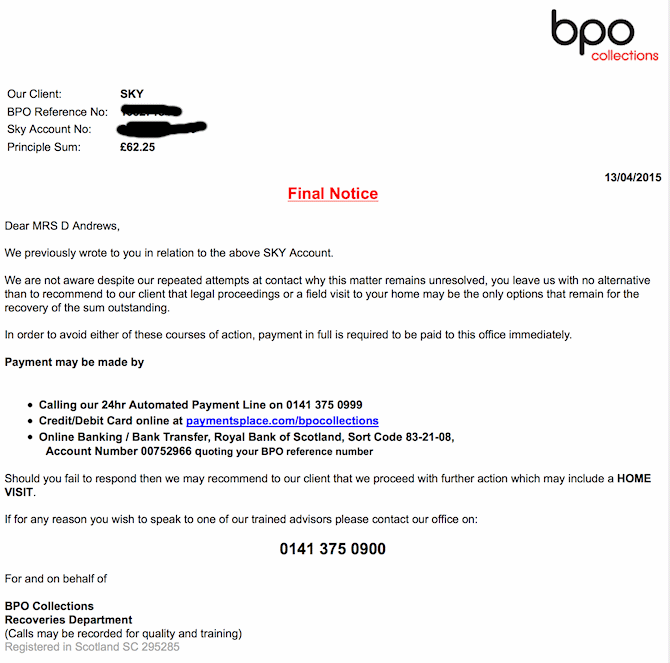Sky Pursues Customer for Outstanding Bill – 2 Years After Death
Dealing with the loss of a loved one is hard enough without also having to tackle debt collectors as they chase for late payments, but how late is too late? According to Sky, which through its debt collection agency BPO have been pursuing one deceased customer for an outstanding payment of £62.25 (TV service), the answer is two years.
The customer in question, Mrs Andrews, sadly passed away two years ago and shortly after that her surviving son-in-law, Adrian Kennard, sent Sky an email confirming that she was deceased. At this point the trail of communication went cold until the following email suddenly dropped.. a whole two years later.
Advertisement

Mr Kennard said, “Even I find this sort of harassment distressing. I only have this because I was the contact for email as she did not have email. Not amused.” The good news is that Sky has agreed to clear the balance on Mrs Andrews account and the debt collection agency has also been informed.
Sadly such situations are not unusual, although they rarely extend quite this far after a person’s death. Never the less we’ve seen plenty of similar cases from different ISPs over the years, with this somewhat morbidly comical example from Virgin Media making the news back in 2013 (note the late payment charge, which hits after the declined direct debit that clearly states “deceased“).

Nothing prepares you for the loss of a loved one, although in this instance it may prove useful to highlight the current rules for tackling late bills and other debts. Firstly, it’s a common misconception that your debts are wiped away when you die and in fact they can sometimes be passed onto a relative or other personal representative.
In most cases when somebody dies that person’s estate (i.e. all their assets and funds) are gathered together and redistributed according to their legal Will, which should ideally be handled by a solicitor, and any debts or payments will also be paid as part of that process.
Advertisement
Any “unsecured debts“, such as phone, broadband, credit cards or water bills etc., are the last to be paid out by the estate and if there isn’t enough money left to do that then the debt can fall onto the shoulders of a relative / personal representative. This is particularly true if any bills were in joint names because the other named party would inherit that responsibility.
However if the deceased didn’t have a big enough estate to cover all of their liabilities then many of the debts can be written off, which prevents creditors from chasing surviving family members. In any case it’s always wise to have a solicitor in your corner so that they can tackle all of the different hassles on your behalf.
In fairness it’s not always easy for broadband providers and other utility companies to know for certain, unless a relative informs them accordingly, when somebody has died. As such it’s important to contact the ISP as soon as possible, which will usually ask you to confirm the deceased’s account number, your name / address, your relationship to the deceased and any action to be taken (cancel the account). As a rule we’d always ask for written confirmation in order to give you a defence against admin errors like the one above.
Equally it’s sometimes the case that a service provider will, in the event of a customer’s death, simply wipe out any outstanding balance and cancel the account without hassle.
Advertisement
Mark is a professional technology writer, IT consultant and computer engineer from Dorset (England), he also founded ISPreview in 1999 and enjoys analysing the latest telecoms and broadband developments. Find me on X (Twitter), Mastodon, Facebook, BlueSky, Threads.net and Linkedin.
« Vodafone UK Opens Pre-Registration for Home Broadband and Phone Service

















































Comments are closed